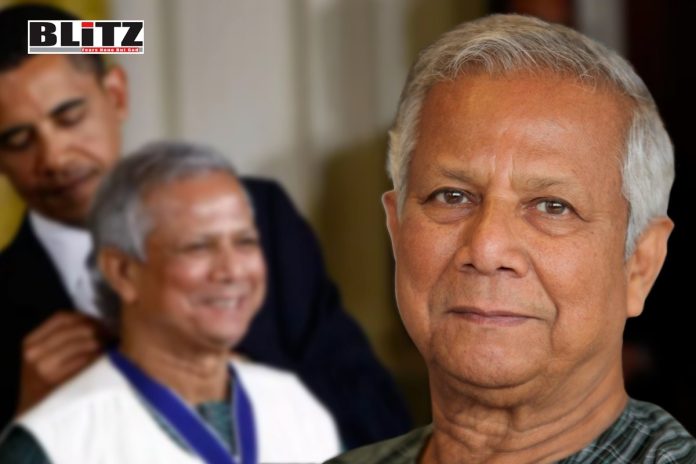In recent years, Muhammad Yunus, the Nobel laureate and founder of Grameen Bank, has come under scrutiny for allegations ranging from financial mismanagement to authoritarian leadership. As Western policymakers and advocates rush to defend his legacy, it is imperative to conduct a thorough examination of these accusations to ensure accountability and integrity in the microfinance sector.
Yunus rose to prominence for his pioneering work in microcredit, which aimed to alleviate poverty by providing small loans to entrepreneurs, particularly women, in developing countries. His efforts earned him the Nobel Peace Prize in 2006 and widespread acclaim as a champion of social entrepreneurship.
However, in recent years, Yunus has faced mounting criticism, particularly regarding his management of Grameen Bank and his leadership style. Allegations of financial irregularities, including the diversion of funds and improper accounting practices, have raised concerns about the integrity of the institution and its impact on the communities it serves.
Moreover, accusations of authoritarianism and lack of transparency in Yunus’ leadership have further tarnished his reputation. Reports of internal dissent, employee mistreatment, and suppression of dissenting voices have prompted calls for greater accountability and oversight within Grameen Bank and other organizations under Yunus’ purview.
While Yunus enjoys widespread support from Western policymakers and philanthropists, including endorsements from prominent figures such as former US President Bill Clinton and Microsoft co-founder Bill Gates, it is essential to critically evaluate these endorsements in light of the allegations against him.
Defending Yunus without addressing the substantive concerns raised by his critics undermines efforts to promote accountability and ethical conduct within the microfinance sector. Western policymakers must resist the temptation to engage in uncritical praise and instead advocate for independent investigations and oversight mechanisms to ensure transparency and accountability.
Furthermore, Western donors and investors should exercise due diligence when supporting organizations affiliated with Yunus, ensuring that their contributions are used effectively and ethically to benefit the intended beneficiaries. Blindly endorsing Yunus without scrutinizing his actions risks enabling potential abuses of power and undermining the credibility of the microfinance movement as a whole.
Before defending Muhammad Yunus and his legacy, Western policymakers must carefully examine the allegations against him and advocate for greater transparency and accountability within the microfinance sector. Upholding ethical standards and promoting integrity should be paramount priorities, even – and especially – when it involves revered figures such as Yunus. Only by holding individuals and institutions accountable can we ensure the continued effectiveness and credibility of efforts to combat poverty and promote economic empowerment around the world.
Meanwhile, media must exercise diligence and critical analysis when reporting on his statements and claims. Despite his laudable achievements, blindly accepting Yunus’ assertions as gospel truth undermines the principles of journalistic integrity and accountability.
Recent controversies surrounding Yunus, including allegations of financial impropriety and authoritarian leadership within Grameen Bank, highlight the importance of independent scrutiny and investigative journalism. While Yunus remains a revered figure, the media must maintain a critical distance and subject his claims to rigorous examination, rather than uncritically amplifying his voice.
One of the key responsibilities of the media is to hold individuals in positions of power and influence accountable, regardless of their stature or reputation. By scrutinizing Yunus’ statements and actions, journalists play a crucial role in fostering transparency, integrity, and ethical conduct within the microfinance sector and beyond.
Moreover, the media must provide a platform for dissenting voices and alternative perspectives, especially when it comes to contentious issues or allegations of wrongdoing. Failure to do so risks perpetuating a narrative of uncritical adulation, which can shield Yunus from much-needed scrutiny and accountability.
In light of Yunus’ significant influence and the potential ramifications of his actions, it is incumbent upon the media to approach his claims with skepticism and impartiality. This does not mean dismissing his contributions outright but rather subjecting them to the same level of scrutiny applied to any public figure.
Furthermore, the media must seek to contextualize Yunus’ statements within the broader socio-political and economic landscape, acknowledging the complexities and nuances inherent in poverty alleviation efforts. By providing comprehensive and balanced coverage, journalists can empower audiences to form informed opinions and make critical assessments of Yunus’ legacy and impact.
While Muhammad Yunus undoubtedly deserves recognition for his contributions to the field of microfinance and poverty alleviation, the media must not abdicate its responsibility to scrutinize his claims and actions. Upholding integrity and accountability requires journalists to maintain a critical distance and subject Yunus’ assertions to rigorous analysis, thereby fostering transparency and ethical conduct within the microfinance sector and society at large.




